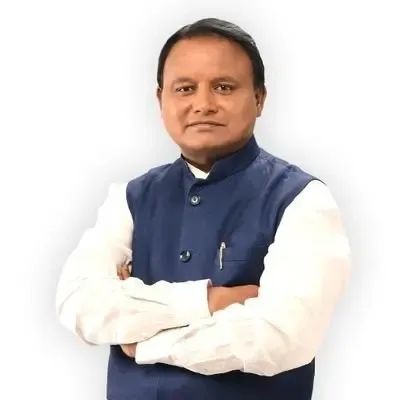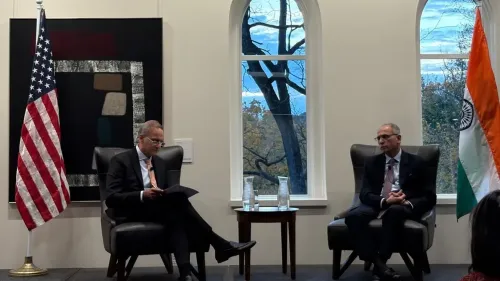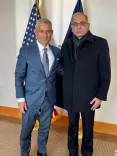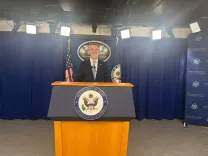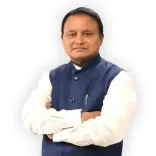Can India Harness Its Strategic Culture Amidst Tensions with Pakistan?
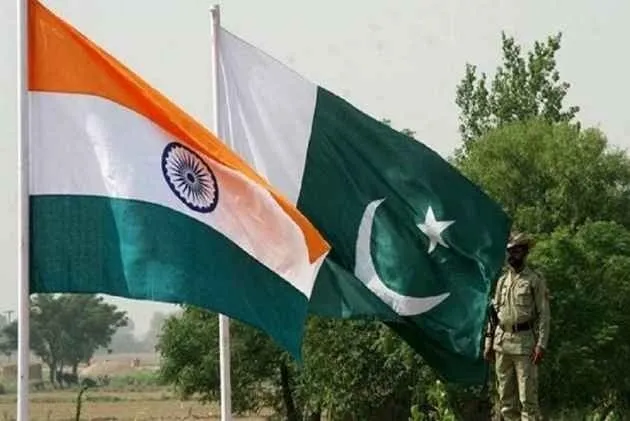
Synopsis
Key Takeaways
- Strategic culture is essential for national unity.
- Historical memory influences perceptions of threats.
- Inclusivity is key to overcoming societal divides.
- Resilience against external threats is paramount.
- Leveraging civilizational roots can strengthen identity.
New Delhi: Strategic culture embodies the shared consciousness of a nation regarding its unity, welfare, and its contributions to humanity.
Recognizing a unified identity is the cornerstone of strategic culture, fundamentally grounded in three 'civilizational' paradigms: the collective 'historical' experiences of its people, their collaborative efforts in the 'present', and their vision of a shared 'destiny'. This interplay renders strategic culture a fusion of a country's 'heritage' and its 'security doctrine' aimed at the future.
Strategic culture thrives on reflections of how 'ancient' this heritage is. In India’s case, it has helped bridge numerous gaps related to language, caste, and regional differences. Unfortunately, the devastating Partition of India, driven by religious divides and the collusion between British powers and politically ambitious Islamic factions, led to the tragic loss of countless lives during communal violence.
The echoes of the Partition riots linger in independent India, which ironically has a larger Muslim population than the Islamic Republic of Pakistan. Since then, India-Pakistan relations have continually tested the endurance of India’s strategic culture due to the nefarious activities orchestrated by the Pakistan Army-ISI nexus, leveraging faith for cross-border terrorism in Kashmir and beyond.
The recent terror strike orchestrated by Pakistan on April 22 in Pahalgam, targeting Hindu tourists, aimed to create internal discord within India. Yet, it ultimately united all Indians against this heinous act, which drew widespread condemnation. Such communal-driven terrorist violence, incited by Pakistan, must be permanently eradicated.
It is essential to note that India’s ancient culture has undergone reforms, such as those initiated by Arya Samaj. However, the exclusionary perspective of proponents of Islamic ‘supremacism’ has obstructed the evolution of our strategic culture to inclusively embrace all citizens of this nation.
Despite being a relatively young religion, Islamic fundamentalists who dominate the community leadership proclaim it as the only 'perfect' faith, asserting that it will remain so since Prophet Mohammad was the 'Khatimul Anbia'—the final prophet.
India's strategic culture emerges from a commitment to humanity, encapsulated in the philosophy of 'Vasudhaiva Kutumbakam' (the world is one family), a stringent rejection of any attempts to destabilize the nation, and a commitment to 'welfarism' that prioritizes the needs of the underprivileged. Indian traditions emphasize peace and harmonious coexistence, a sentiment shared by members of minority communities who appreciate the constitutional guarantee of freedom of religion.
Strategic culture mandates that citizens collectively agree on what constitutes a threat—both external and internal—and what sacrifices they are willing to make for national security.
A nation’s strategic culture is tested in times of 'war and peace'. In response to the events in Pahalgam, India's unity rallied around a national call for decisive action to dismantle terrorist infrastructures across the border and eliminate those who harbor such threats. This response was bolstered by the secular framework embedded within the foundations of democratic India, even if not explicitly stated in the Preamble.
Unlike Pakistan, which is marked by a denominational identity, India’s state operates under the principle of 'one man, one vote', ensuring political equality for all citizens and allowing them the freedom to practice any faith, with state policies applying uniformly to everyone.
The challenges hindering the advancement of India’s strategic culture are primarily instigated by Pakistan, which has employed Islamic terrorism as a state policy against India, coupled with the strategic Sino-Pak alliance primarily aimed at undermining this country.
Pakistan has provided sanctuary to radical Islamic leaders while maintaining favorable relations with the US, aided by the strong ties between Pakistani generals and the Pentagon. Jamaat-e-Islami, established in 1941 by Maulana Abul Ala Maudoodi with pro-British ties, has been a significant tool of the ISI in sustaining pro-Pakistan sentiment in Kashmir and throughout India.
It’s worth recalling that Jamaat was pivotal in General Ziaul Haq’s campaign to establish Nizam-e-Mustafa in Pakistan. As president, Ziaul Haq fervently promoted the concept of Ummah, advocating for a unified Islamic identity spanning from Morocco to the Philippines. Jamaat’s affiliate, Hizbul Mujahideen, was also at the forefront during the anti-Soviet resistance in Afghanistan.
The US credited Pakistan for the success of this campaign, which further motivated Pakistan to replicate the Afghan jihad in Kashmir.
In the US-led 'war on terror', Pakistan has played a dubious role, sheltering figures like Osama bin Laden. Pakistan has also pretended to mediate between the Taliban and the US during negotiations in Doha concerning the withdrawal of American troops from Afghanistan, a matter of significant political concern for President Biden. In doing so, Pakistan managed to reinstate the Kabul Emirate in 2021, which it had first achieved in 1996, while also facilitating a 'give-and-take' arrangement between Taliban and China, permitting China to expand its Belt and Road Initiative (BRI) into Afghanistan in exchange for Taliban’s silence on issues concerning Muslim minorities in China.
Pakistan exploits militant groups across the Islamic spectrum, ranging from anti-US factions like Al Qaeda and ISIS to Hizbul Mujahideen and Saudi-backed Lashkar-e-Taiba, revealing the inconsistencies in American policies that once sought to differentiate between 'good terrorists' and 'bad terrorists'.
The Biden administration seems to perceive the Pakistan-Afghan region with a degree of detachment, despite it being a hotbed for faith-based terror.
For India, it is encouraging that President Trump has openly condemned 'Islamic terrorism' and imposed visa restrictions on countries that foster such ideologies. It remains to be seen how the Trump administration overcomes the legacy of the Pentagon’s long-standing ties with Pakistan’s military leadership and recognizes Pakistan’s role in leveraging terrorism as a state instrument.
Following the Pahalgam attack, India conducted retaliatory air strikes against terrorist bases and training camps across Pakistan-occupied Kashmir and the India-Pakistan border, inflicting significant damage on these sites. When Pakistan attempted drone strikes near the Line of Control, India escalated its missile attacks, damaging several key air bases in Pakistan.
It appears that the Pakistan military urgently requested President Trump’s intervention, reminding him of the nuclear implications of a potential Indo-Pak conflict, and urged for ceasefire negotiations.
Notably, the US President tweeted about the necessity of preventing the loss of 'millions of lives'.
Marco Rubio, the US Secretary of State, engaged with General Asim Munir, the Pakistan army chief, and subsequently spoke with India’s civilian leadership. India accepted Pakistan's request for a ceasefire. However, in a public address on June 12, Prime Minister Modi articulated what seemed to be a National Security Doctrine moving forward. He noted that Operation Sindoor had provided some 'emotional' satisfaction regarding the retaliation for Pahalgam, commending the successes of India’s armed forces while emphasizing the nation’s technological advancements. He clarified that, despite the ceasefire, any further terror attacks from Pakistan would be treated equivalently to acts of war, with an appropriate response from India’s military. He termed this stance as the 'new normal'.
The Prime Minister reaffirmed that the nuclear threat posed by Pakistan would not intimidate India and stated that any discussions with Pakistan would be solely focused on 'terrorism' and Pakistan-occupied Kashmir, asserting that negotiations and terror cannot coexist, akin to the saying 'blood and water cannot flow together', which also alluded to India’s rights concerning the Indus Waters Treaty.
It is conceivable that the US President’s intervention in the India-Pakistan conflict was intended to alleviate pressure on Pakistan, yet Trump would be unlikely to take any action that could jeopardize the strategic alliance between India and the US.
A direct line of communication between India and Pakistan at the Director General of Military Operations level does not alter India’s future stance as defined by Prime Minister Modi in his address on June 12.
India faces profound geopolitical and immediate threats to its national security, stability, and integrity, alongside challenges to its strategic culture, stemming from the partnership between its primary adversaries—Pakistan and China, the potential for hostile forces to instigate internal unrest, and existing domestic contradictions along religious, sectarian, and regional lines.
To bolster national unity through a cohesive strategic culture, India must return to its civilizational roots.
Interestingly, Xi Jinping, a dictator in China, while managing the nation under traditional Communist one-party rule, has recently begun emphasizing China’s 'civilizational strength' to unify his people amid growing political and cultural divides.
In this era of unpredictable geopolitical dynamics and the resurgence of a Cold War between the US-led West and the China-led bloc, including Iran, India must fortify its unity and national strength, drawing from its strategic culture. The events in Pahalgam have underscored that peace, social harmony, and a firm stance against terrorism are paramount national priorities for all Indians—these ideals are integral to India’s widely shared strategic culture.
(The writer is a former Director of the Intelligence Bureau)

